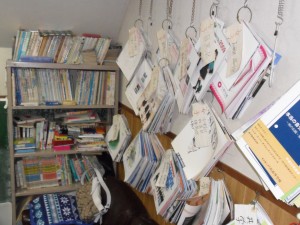A guest post by Steve Entrich, Research Assistant at the University of Potsdam, Germany:
Who thinks that Japanese students should have gotten tired of juku classes by now is proven wrong. The hope to pass the difficult entrance examinations and get access to a prestigious university like the Tōdai (Tokyo University) and by this increase the chances to get hired for a desirable steady position in one of Japan’s big companies or government agencies, is a strong motivator for students to still give it their all. Following the unwritten rule saying that school education alone will not prepare a student sufficiently enough to let him survive in the tough business world students are more than ever supposed to take extra classes outside of school.
Nowadays parents are even told by their students’ school teachers to send their children to a juku in order to manage to get into the school or university they desire. As you can imagine foreign parents resist the idea of sending their children to take supplementary lessons at juku when they have to attend formal classes all day already – at first. In an interview survey carried out by Dr. Melodie Cook from Niigata University, which I had the pleasure to meet at a conference in October last year in Osaka, it was shown how foreign parents reconsider their view about juku. Despite having prejudices at first, in the end nearly all foreign parents enrolled their children at a juku.
When I was talking to Japanese (and non-Japanese) parents, researchers as well as juku owners one thing seemed to be consensus and commonly accepted: It cannot be helped, students have to attend a juku if they want to get a job. Therefore everybody has to accept the existence of juku and their function in the Japanese educational system. There is just no other option left for parents than to send their children to these private schools and invest a large extra amount of money for the children’s education. From a Western perspective it often seems negligently how Japanese educational policy gave way for the development of this system until it has become influential in such a way that it is perceived the formal school system alone is not able to fulfill its given educational mission anymore. In 2005 The Japan Times called it a “cash in on failure of public schools”.
In addition, the ones partly responsible for this and simultaneously beneficiaries of this system are, of course, the juku themselves. Surprisingly, the heads and leaders of juku are blaming the government for missing engagement in the education sector for so many years; they also explain their concerns about the well-being of the children. Here juku heads told me that they would like a change in this system as there was too much pressure on the students. The yutori education reform was not so bad one said, but carried out in the wrong way giving way for critics of the conservative forces resulting in increased pressure of students. It is considered too much weight on the small shoulders of students, if they first have to sit in school all day and following this, they have to attend their “second” school until nine or ten in the evening.
Nevertheless, a change might be coming in time said the leader of a big chain juku trying to paint a brighter picture. He finds it reasonable to believe that education as a whole might also be suspect to change in the near future including the private education and juku sector. Parents nowadays are questioning more for what purpose their children are studying, if there is no perspective for many of them after getting into university. The fundamental achievement principle might lose ground, since long given guarantees are not existing anymore. The strict organization of the school system is crumbling slowly due to the increasing internationalization resulting in a general, greater openness of education.
Still, until this change is starting to bear fruit students in Japan cannot possibly achieve their educational and career goals without the investment in juku – or so it seems.


